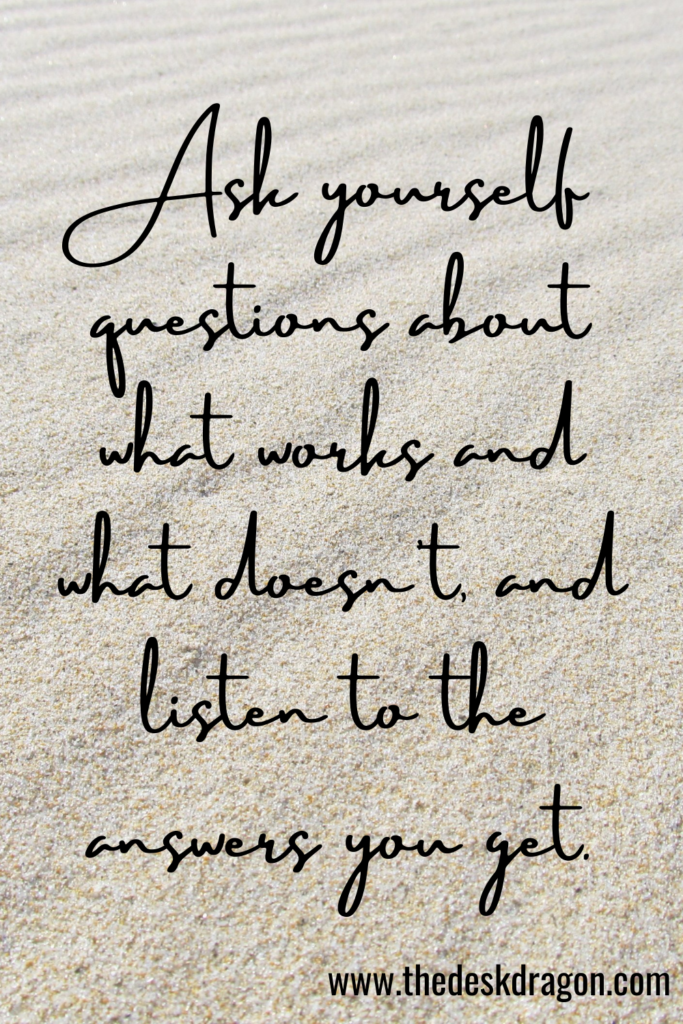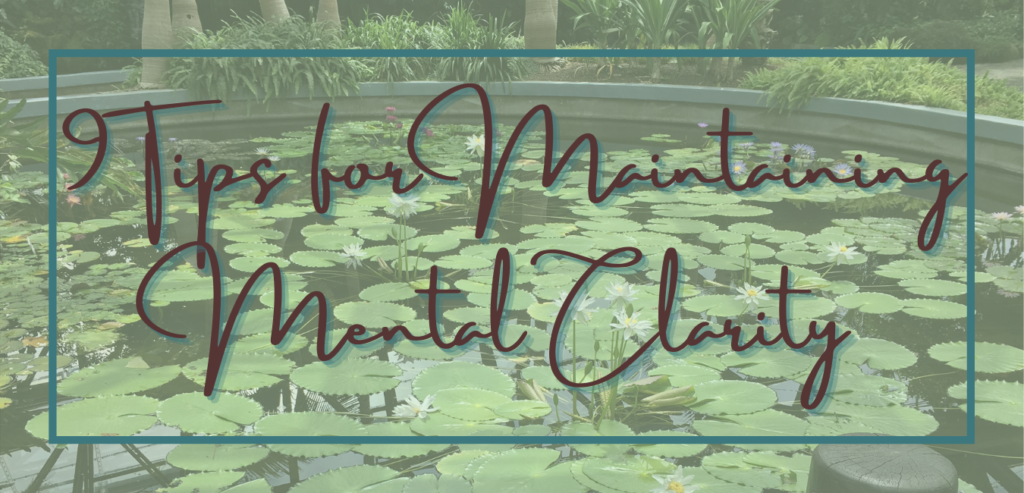I talk a lot on this blog about mental clarity and its importance, so I thought I would share a few of the methods and practices that have proven valuable in my own life. Obviously, this is far from an exhaustive list, and not everything that works for one person will work for someone else, but I hope that you will find at least a few of them to be helpful.
I plan to write more in-depth about several of these topics, so stay tuned if any of them particularly interests you, and leave a comment to let me know you’d like to read more posts about it.
1. Simplify

I cannot stress this one enough, because it’s the key to almost all of the others. Simplicity naturally enables more mental clarity, because it reduces the amount of information vying for your attention. A few specific areas of life to simplify include:
Decisions: Habits eliminate the need to make a conscious decision to do something (or not do something, as the case may be). I don’t have to choose what to do first thing in the morning, because I have an established, habitual routine I (almost) always follow.
Physical Space: Having fewer things sitting on my desk helps keep me from feeling boxed in (and makes it easier to keep the desk clean and neat). I wouldn’t call myself a Minimalist, but I have learned the value of owning fewer things that I really care about and enjoy using, rather than collecting things I somewhat like that end up with their own collection — of dust.
Routines & Habits: When I first starting working on forming my own habits and routines, I tried to start a whole bunch of habits at once. When you’re only in the planning phase, it’s fun to list out all the activities you can think of to add to your morning or evening routine. But in my experience, that quickly becomes a race to check off all the boxes and feelings of stress when there isn’t enough time. Habits start to drop off one by one, until there aren’t any left. Instead, it’s much better to start off slow with one or two habits, and gradually add more later.
How to Simplify Your Life
Not sure where to start on these? My resource library has a bunch of worksheets and cheat sheets to help you out! Sign up using the form below to get access.
2. Know Yourself
In order to work well with someone else, you have to get to know and understand them — and the same holds true for yourself. If you don’t know your own limits, it’s hard to set reasonable boundaries. If you don’t know what kinds of routines and systems make you most productive, you’re likely to spend a lot of time frustrated because someone else’s system doesn’t work for you. Spend some time trying out different methods, ask yourself questions about what works and what doesn’t and why, and listen to the answers you get.

3. Always Put Things Back in the Same Place
Losing important things like keys, wallets, and cell phones is a huge cause of stress. Having a specific place to put these things, and always returning them to that place, is a great way to solve that problem. I have even made it a habit to put my keys in the same pocket of my purse when I go out, so I don’t have to dig through everything to find them when I reach my front door. Sometimes this works so well, I don’t even remember putting them in that pocket — and yet there they are.
4. Write Things Down
When we carry all of our thoughts and ideas in our heads, they become crowded and tangled, and some of the thoughts hide behind others. Writing everything down, whether it be in the form of a list, a stream-of-consciousness paragraph, a mind map, or something else, helps us keep from skipping over the more elusive thoughts as well as see patterns and connections more easily.
A few years ago, I started bullet journaling, a system that combines a planner, a journal, and more into one notebook. Since then, I have been able to keep much better track of my to-dos, memories, and thoughts, simply because I make a habit of writing them down.

And in connection with that…
5. Make a List Every Day
Personally, I prefer the action of physically writing my daily to-do list in my journal every morning. Others have more success making their list the night before and/or digitally rather than on paper. Whatever method you use, having that list of everything that needs to be done that day keeps you from forgetting things, gives you a starting point to pick back up from if you get distracted or interrupted, and helps increase momentum as you check each item off.
6. Set Boundaries
As a people-pleaser, I have spent a lot of time stressing out over things I agreed to do even though I didn’t want to. Learning to say “no” has helped me to be happier and to have more time for things I do want to do. Setting and upholding boundaries also helps with simplifying decisions, because you don’t have to think up excuses or talk yourself into saying “yes” when you don’t want to.
7. Break Large Tasks Into Steps

When you approach a task and feel overwhelmed because you don’t know where to start, there’s a good chance it isn’t actually one task, but many. Break it down into the smallest pieces possible; sometimes it might even help to imagine that you’re leaving instructions for someone else to follow, and they don’t have any knowledge or previous experience related to the project. Then, once you have a list of all the steps you’ll need to complete in order to finish the project, tackle it one step at a time.
8. Regularly Evaluate Your Progress & Systems
Another way that I have gained more mental clarity with my journal is by using it to review on a regular basis. I take note of what I have accomplished and what I still need to work on, how I’m feeling and why, and what changes I need to make. That way I’m not just going through the days on autopilot, thinking things are fine when they aren’t, or vice versa.
This gives me perspective and prepares me for the final tip on this list:
9. Start Fresh Every Morning, Every Week, Every Month, Every Year
I’ll probably have to write a separate post about my bullet journal, but another advantage I have found in that system is that it allows me to start every day on a literal blank page. And I supplement this with routines that structure the day into a beginning, middle, and end. Every morning, I come to my desk fresh and ready to take on what the day may throw at me. And every night, I go through a process of “shutting down”: reviewing what I did and didn’t do, making note of what needs to be carried over to the next day, and letting go of what doesn’t. I do this on a more long-term basis as well, thus turning each day, week, month, and year into an opportunity for a new beginning.

Which of these tips do you practice to maintain mental clarity in your life? What other tips have you found helpful? I would love to hear from you.
Did you know?
I offer writing & editing, podcast production, and virtual admin services.
Click here to see how I can help you get more time back in your day!

